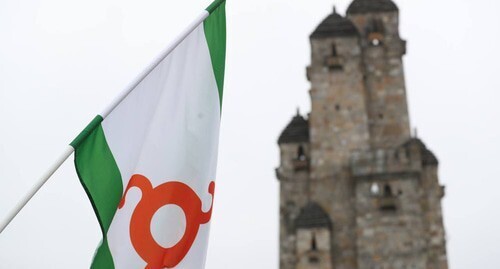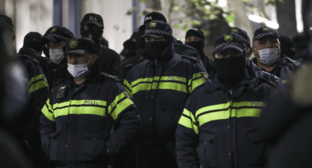
26 February 2024, 23:16
Week in the Caucasus: review of main events of February 19-25, 2024
Eighty years after the deportation, persecution of pacifists and activists in Southern Russia, death of Alexei Navalny* and Caucasus, and official data on the natives of Southern Russia who perished in Ukraine, – see the review of these and other events in the Caucasus during the week of February 19-25, 2024, prepared by the “Caucasian Knot”.
Eighty years after deportation
In Grozny, Chechen officials and MPs organized a rally in memory of the victims of the Stalin’s repressions. This time, the event took place without the participation of Ramzan Kadyrov, who limited himself to a post in the Telegram channel on the occasion of the 80th anniversary of the deportation of the Vainakh people. In Nazran, hundreds of people came to a mourning meeting, including Ingush leader Makhmud-Ali Kalimatov.
Eighty years ago, on February 23, 1944, the operation “Chechevitsa” (Lentil) was launched, during which almost 500,000 Chechen and Ingush people were evicted from the Chechen-Ingush Autonomous Soviet Socialist Republic (ASSR) to Kazakhstan and Central Asia.
The public organization “Aukh” announced Muslim rites of mourning and remembrance in the Novolaksky District of Dagestan. The local prosecutor’s office warned the organizers against holding rallies and pickets not sanctioned by the authorities. According to local activists, the restoration of the Aukhovsky District, which was planned to be completed by 2025, has been stopped for many years, the resettlement of Laks and the construction of new houses have been disrupted. Residents of the Novolaksky District have noted that they have to remind the authorities of the need for complete territorial and political rehabilitation of the Chechen people.
The human rights “Memory Project” dedicated the film “Neither Alive nor Dead” to the anniversary of the deportation of the Ingush and Chechens. The film tells stories about people who survived the forced disappearance of their relatives in Chechnya in the 2000s. The animated film is based on interviews with relatives of the disappeared people, many of whom witnessed their detentions.
Persecution of pacifists and activists in Southern Russia
Igor Pavlov, a resident of Budyonnovsk in the Stavropol Territory, left comments on the “VKontakte” social network, in which he used a phrase recognized as an extremist slogan and accused President Vladimir Putin and his supporters of lying. The court recognized that by doing the above, Igor Pavlov discredited the Russian Armed Forces. The defendant admitted guilt and expressed his remorse. Igor Pavlov was fined 30,000 roubles.
According to the investigators’ version, on December 22, a student of the Adyghe State University posted on the “VKontakte” social network “the comments with signs of conviction about the negative nature of the use of the Russian Armed Forces during the special military operation.” The student admitted her guilt and repented. The Maikop City Court imposed a fine of 30,000 roubles on her.
The Chegemsky District Court of Kabardino-Balkaria repeatedly received an administrative case against a local resident. Earlier, the protocol had been returned to the police because of shortcomings. The first report against Murat Kyagov was submitted to the court on February 7, after he posted a video on the Internet discrediting the Russian Armed Forces.
In Kazan, law enforcers detained Askhabali Alibekov, a native of Dagestan, an author of the YouTube channel “Wild Paratrooper”, removing him from the train. On March 23, 2023, Askhabali Alibekov was sentenced to a year and two months of imprisonment after the court found that a video posted on his YouTube channel discredited the Russian Army. On November 10, 2023, it became known that Askhabali Alibekov was released. Later, he complained about conditions of detention in the penal colony.
Death of Alexei Navalny* and Caucasus
Residents of Sochi bring flowers to the memorial to Alexei Navalny*, spontaneously formed near the monument to the victims of political repression. Activist Grigory Uchkurov has expressed his indignation by saying that people want to express their grief, but the police regularly clear the monument of flowers. The activist considers the actions of the law enforcers immoral, since they do not respect the feelings of people.
A spontaneous memorial to Alexei Navalny * has appeared in the Reduktorny village of Makhachkala, the “RusNews” reports in its Telegram channel. The video shows a portrait of Alexei Navalny * and several bouquets of flowers at the memorial “Victims of Political Repression”.
On February 20, Mark Libby and Fergus Auld, the US and British Ambassadors to Azerbaijan, respectively, laid flowers at the monument to poet and playwright Huseyn Javid, a victim of the Stalin’s repression, near which a memorial to Alexei Navalny * was spontaneously formed.
Residents of Russian cities, including in the south of the country, have been persecuted for their attempts to lay flowers at monuments to the victims of political repression.
Official data on natives of Southern Russia perished in Ukraine
By February 25, the authorities and the law enforcement bodies reported about at least 3464 residents of Southern Russia perished in Ukraine, including 1694 residents of the North-Caucasian Federal District (NCFD) and 1770 residents of the Southern Federal District (SFD).
In Dagestan, the authorities reported about 756 local residents perished in Ukraine, in the Volgograd Region – 685, in the Rostov Region – 386, in the Krasnodar Territory – 319, in Stavropol Territory – 285, in the Astrakhan Region – 269, in North Ossetia – 260, in Chechnya – 172, in Kabardino-Balkaria – 126, in Kalmykia – 61, in Ingushetia – 50, in Adygea – 50, and in Karachay-Cherkessia – 45.
Neither state awards nor memorial plaques to those killed in the special military operation (SMO) guarantee their families support from the state.
*On January 25, 2022, the “Rosfinmonitoring” (the Russian Federal Service for Financial Monitoring) included Alexei Navalny into the register of extremists and terrorists. He is a founder of the Anti-Corruption Foundation (known as FBK), an NCO that is included by the Russian Ministry of Justice (MoJ) in the register of NCOs performing functions of a foreign agent, recognized as extremist and banned in the Russian Federation. Convicted on probation in a case on fraud. In February 2021, the term was replaced with imprisonment. In a penal colony, Alexei Navalny was charged with fraud and contempt of court and sentenced to 9 years of imprisonment. Furthermore, Alexei Navalny was also sentenced to 19 years of imprisonment in a case on disorganizing the penal colony, extremism, and rehabilitation of Nazism. In April 2023, Alexei Navalny announced that he faced life imprisonment in the case on terrorism. Recognized as a “prisoner of conscience.” The “Caucasian Knot” material “Navalny: Caucasian Dimension” sets out the oppositionist’s views on the problems related to the Caucasus. The Alexei Navalny’s offices, which previously operated in the Russian regions, are recognized in Russia as extremist organizations and included in the list of prohibited organizations.
This article was originally published on the Russian page of 24/7 Internet agency ‘Caucasian Knot’ on February 26, 2024 at 09:10 am MSK. To access the full text of the article, click here.




